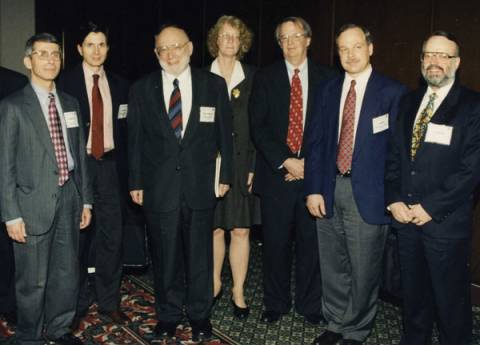You are here
It’s the people who think outside the box who achieve success beyond what might otherwise be expected.
Peter Drotman, MD, MPH, EIS ’79, Editor-in-Chief of the Emerging Infectious Diseases journal at Centers for Disease Control and Prevention (CDC)
Throughout his career—one which has taken him across the globe, working on diseases ranging from smallpox to HIV/AIDS—Dr. Peter Drotman has been guided by his passion for global public health, leaving his own distinct mark on the field.
Born in the Bronx and raised in Scarsdale, New York, Drotman’s career began with an interest in medicine sparked by admiration for his pediatrician and his mother’s nursing career. After high school, Drotman attended Union College in Schenectady, New York and completed his medical studies at the University of Hawaii and the University of Southern California, on track to specialize in adolescent medicine.
Though he would later become editor-in-chief of the high impact, open access journal Emerging Infectious Diseases, Drotman initially had little interest in studying infectious diseases. It was not until his preventive medicine residency at UCLA—when he received word of a chance to work with the World Health Organization to eradicate smallpox in Bangladesh—that his interests began to shift. Though he had never seen a case of smallpox in person, Drotman recognized the significance of the opportunity before him and ultimately became part of the team that saw the eradication of smallpox in Bangladesh, the last country in Asia to have cases of the disease. Smallpox remains the only infectious disease to have been successfully eradicated among humans.
Upon returning to the United States and completing his studies at UCLA, Drotman signed a two-year contract to launch his career at CDC as an Epidemic Intelligence Service officer investigating cancer clusters. “Toward the end of my contract,” Drotman said, “a new cancer cluster arose.” The cancer was identified as Kaposi sarcoma, and it was occurring in young gay men.
“I said, ‘this is something for me to work on.’ It turned out to be one of the earliest manifestations of what would later be termed the AIDS epidemic.”
After being one of the last epidemiologists to see a case of smallpox, Drotman became one of the first to see a case of HIV/AIDS. He was initially assigned to work on Kaposi sarcoma and opportunistic infections for 90 days. “We didn’t know it would become a global pandemic with millions of cases.”
At a time when violent prejudice against the LGBTQ community was rampant and many other healthcare professionals refused to see patients with HIV/AIDS, Drotman chose to extend his 90-day work period on Kaposi sarcoma and opportunistic infections on a team led by CDC’s Dr. James Curran.
All of the initial cases of HIV/AIDS Drotman saw proved fatal.
“In their final weeks and days of life I talked with critically ill patients and they disclosed to me the most intimate details of all of their experiences in an attempt to help us identify what the common factors were among all the cases so I could identify what the risk factors were. They knew they were dying, and I knew they were dying—but they put out their last measure of strength to answer these questions.”
Dr. James Curran would continue to be Drotman’s supervisor for the next 14 years, a period that marked a pivotal transition in Drotman’s career. Though he was formally trained in chronic diseases, he discovered a passion for work on infectious diseases. When Dr. Curran departed from CDC to become dean of Emory University’s Rollins School of Public Health, Drotman also decided it was time for a career change, so he moved to enter the broader arena of emerging infectious diseases in the National Center for Infectious Diseases under the leadership of Dr. James Hughes.
Emerging Infectious Diseases, Volume 8, Number 10-October 2002.
Dr. Drotman in front of the April 2007 edition of Emerging Infectious Diseases
Emerging Infectious Diseases - Volume 9, Number 10-October 2003.
In 2001, Dr. Hughes named Drotman editor in chief of the Emerging Infectious Diseases journal. Early in his tenure, Emerging Infectious Diseases saw rapid growth for publishing timely research on cases of bioterrorism after 9/11—specifically about anthrax mailed by envelope to influential political figures and news outlets. After that, “anyone who was following public health had to get that journal,” Drotman said. “It put the journal on the map.” Additionally, Drotman was an advocate for adding relevant art to the covers, quipping that this humanizing touch helps balance the fact that “you don’t want to end up in our pages.” He remains editor-in-chief of Emerging Infectious Diseases.

Keynote speakers at the inaugural International Conference on Emerging Infectious Diseases in Atlanta, March 8–11, 1998.
Left to right: Anthony Fauci, David Heymann, Joshua Lederberg, Claire Broome, James Hughes, Guthrie Birkhead, D. Peter Drotman.
Reflecting on a CDC career of over 40 years, Drotman began making directed annual contributions to the CDC Foundation in 2019, building toward an endowed fund called the D. Peter Drotman Endowment for Disease Eradication. He appreciates the CDC Foundation’s unique ability to mobilize philanthropic and private-sector resources, which will help CDC respond swiftly to emerging public health issues in the future, much like he has done throughout his career. Additionally, Drotman’s intent to leave a legacy gift to the CDC Foundation has also secured his place in the honorary Healthy Futures Society, which recognizes individuals and families that have included the CDC Foundation in their wills or other estate plans.
Like many of the CDC Foundation’s donors, Drotman is inspired by the collaborative nature of work in public health. Having worked firsthand on large-scale cooperative efforts such as the eradication of smallpox and the multifaceted response to the AIDS epidemic, Drotman is committed to cementing his professional legacy with the CDC Foundation. His generosity and foresight will benefit and inspire generations to come.
If an immense number of people work together in creative ways, you can accomplish magnificent things—like the eradication of a disease.
If you wish to leave the impact of a lifetime and become a member of the Healthy Futures Society, the CDC Foundation has tools for you to explore. You can always reach out to Helene Erenberg, director of major gifts and individual support via phone at 404.443.1139 or by email with any additional questions about supporting the CDC Foundation.
